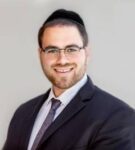By Rabbi Daniel Reich

LA JOLLA, California — Kriyat Yam Suf, the splitting of the sea, stands out as one of the most profound manifestations of God’s dominion over the world. Moreover, it serves as another poignant example of how God employs His power for the welfare of the Jewish people, a theme consistently witnessed throughout history.
Just as we reflected upon in recent parshiot, the miracles accompanying the exodus (the ten plagues, etc.) were astonishing in their own right. However, the realization that God performed them on behalf of the Jewish people underscores the distinctive relationship between God and His Chosen Nation.
When it came to the splitting of the sea, the magnitude of this relationship became even more apparent. Not only did God part the sea, but the Mishnah, found in Pirkei Avos, tells us that there were 10 distinct miracles that occurred at Kriyat Yam Suf:
Rabbeynu Yonah of Geronda (1180-1263) outlines what these miracles were: 1) The sea split. 2) The water formed a suspended tunnel. 3) The sand beneath them dried. 4) It softened again when the Egyptians approached. 5) The water surrounding them solidified like ice. 6) The water split into 12 parts, allowing the tribes to stay together. 7) The ground beneath their feet hardened like tile as they traversed the sea. 8) The walls of water were transparent, enabling each tribe to see the others. 9) They could drink from the water, and it was sweet. 10) When they scooped out water from the sea, it didn’t leave a hole, even though it was solid.
Just envision witnessing Hashem’s hand so vividly! This makes the subsequent events all the more bewildering.
Immediately after experiencing these incredible miracles, after seeing the hand of God saving them before their very eyes, the Jewish people begin to complain to God! As the verse states: “In the wilderness, the whole Israelite community grumbled against Moses and Aaron. The Israelites said to them, ‘If only we had died by the hand of God in the land of Egypt, when we at least had food, when we ate our fill of bread! For you have brought us out into this wilderness to starve this whole congregation to death.’” (Shemot 16)
How could they complain after all they had experienced? Time and again, they witnessed the hand of God caring for them. How could they think, let alone complain, that Hashem wasn’t taking care of them?
Rav Eliyahu Dessler (1892 – 1953) explains that there is a fundamental lesson to be gleaned from the fact that the Jews could complain about God at this moment. He posits that moments of great revelation and inspiration can actually render us vulnerable to trials and tests of faith. During these moments, we are challenged as to whether we can grow from the experience or if we will revert to our old habits. Essentially, there is no such thing as spiritual invincibility.
In fact, Rav Dessler points out that the Torah itself refers to the greatest moment in world history—the mass revelation at Sinai—as a “test” of faith. As the Torah states in the context of the giving of the Torah: “All the people witnessed the thunder and lightning, the blare of the horn and the mountain smoking; and when the people saw it, they fell back and stood at a distance. ‘You speak to us,’ they said to Moses, ‘and we will obey; but let not God speak to us, lest we die.’ Moses answered the people, ‘Be not afraid; for God has come only in order to test you, and in order that the fear of God may be ever with you, so that you do not go astray.’” (Shemot 20)
Since October 7th, we as a nation have been shaken to our core. A positive outcome from that most horrific day has been our increased unity and growth in Torah, davening, and chesed. Now is the time for us to resolve to continue growing from this point forward. We will not cease, of course, until the release of all the hostages and the complete victory of our Chayalim, but will persist until the coming of Mashiach!
*
Rabbi Daniel Reich is spiritual leader of Congregation Adat Yeshurun in La Jolla.